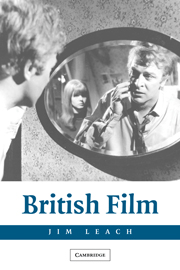Book contents
- Frontmatter
- Contents
- Acknowledgments
- Introduction
- 1 The National Health: Great Britain/Deep England
- 2 The Magic Box: What Is British Cinema?
- 3 The Common Touch: The Art of Being Realistic
- 4 The Mirror Crack'd: British Expressionism
- 5 Millions like Us: National Cinema as Popular Cinema
- 6 The Stars Look Down: Acting British
- 7 No Sex Please – We're British: Sex, Gender, and the National Character
- 8 Carry On Regardless: The British Sense of Humor
- 9 Sexy Beasts: British Monsters
- 10 The Ruling Class: Ideology and the School Movie
- 11 The Long Memory: History and Heritage
- 12 I'm British but … : Empire and After
- Notes
- Bibliography
- Filmography
- Index
7 - No Sex Please – We're British: Sex, Gender, and the National Character
Published online by Cambridge University Press: 07 May 2010
- Frontmatter
- Contents
- Acknowledgments
- Introduction
- 1 The National Health: Great Britain/Deep England
- 2 The Magic Box: What Is British Cinema?
- 3 The Common Touch: The Art of Being Realistic
- 4 The Mirror Crack'd: British Expressionism
- 5 Millions like Us: National Cinema as Popular Cinema
- 6 The Stars Look Down: Acting British
- 7 No Sex Please – We're British: Sex, Gender, and the National Character
- 8 Carry On Regardless: The British Sense of Humor
- 9 Sexy Beasts: British Monsters
- 10 The Ruling Class: Ideology and the School Movie
- 11 The Long Memory: History and Heritage
- 12 I'm British but … : Empire and After
- Notes
- Bibliography
- Filmography
- Index
Summary
The emergence of Diana Dors in the 1950s as Britain's answer to Marilyn Monroe was widely interpreted as a challenge to the restraint that traditionally prevailed in representations of sexuality in the national culture. Dors presented herself as “the first sex symbol this country ever had” but lamented that “British directors … are afraid of sex.” Sex was certainly far from absent in earlier British films, but it was usually treated discreetly, by implication and innuendo. Much the same could be said of Hollywood cinema after the introduction of the Production Code in the early 1930s, but the star system invested the films with an aura of glamour that had a sensuous and erotic appeal. As we saw in the last chapter, glamour in British films was so bound up with the class system that it often seemed quite remote from popular audiences, and sexuality was represented primarily through the chivalric codes of gentlemanly and ladylike behavior.
Glamour is, of course, partly a matter of production values, and there was, in Britain as in Hollywood, a low-budget sector of production – mainly action genres and working-class comedies – in which a more down-to-earth approach to sexuality prevailed. Yet the trappings of glamour dominated film publicity and excited the fantasies of filmgoers. It constituted the “tinsel” that was anathema to the realist critics and filmmakers who feared its effects on the national culture. John Grierson, for example, felt that the romantic plots of Hollywood films depended on “the face-to-face love-howls of hero and heroine” and wished that there could be “exclusively women's theatres which men may know to avoid.”
- Type
- Chapter
- Information
- British Film , pp. 124 - 142Publisher: Cambridge University PressPrint publication year: 2004



